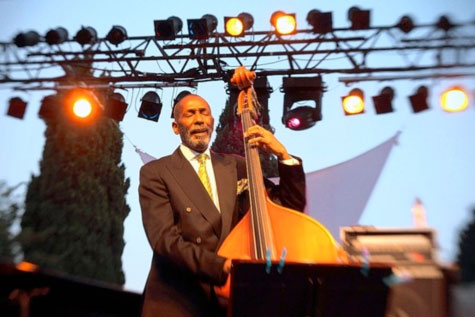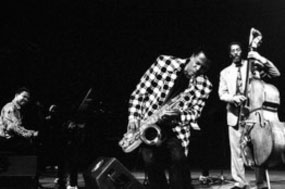Wall Street Journal
August 30, 2011
A Bigger Band, the Same Steady Hand

Bassist Ron Carter performs in France in 2010
Sometimes the most crucial elements in a musical work are the least noticed. A symphony's slowly shifting harmonies shape its dramatic structure, yet audiences will more likely notice the fancy figurations that skitter above them. The same is true of jazz bassists, who lay down the foundation in a musical ensemble, yet often remain in the shadows. Ron Carter, who will be leading a big band at Jazz Standard from Tuesday through Sunday, is an exception: His skill, taste and creativity compel us to pay attention.
Mr. Carter first emerged as a major force in the Miles Davis Quintet of the 1960s. It was a group distinguished by an almost supernatural level of collaborative interplay (titling one of their albums "E.S.P." was no idle boast), and he was the glue that bound those disparate voices together. "Someone had to have the audacity and the confidence to say, 'Here's the top of the tune. Here's one.' That was my role," the bassist remembered. "I was right most of the time." The intricacy and nuance of the group's improvisations still stand as jaw-dropping achievements. "We weren't playing the music," Mr. Carter once reported. "We were the music."
Yet this consummate professional has never been limited to just one style. He has appeared on more than 2,500 albums to date—in myriad genres and settings. Back in 2000, a journalist asked him if there were any famous musicians with whom he had not yet played, and he came up with four or five names, including the formidable Oscar Peterson (whom he still describes as "Hercules"). It wasn't long before he received a phone call. "I understand I'm on your list," Mr. Peterson said. "Let's fix that. Why don't you join me on my next date?"
Now Mr. Carter is about to expand his résumé once again. The 74-year-old, who lives on the Upper West Side, has performed in nearly every conceivable setting, including solo recital, small group and even string orchestra. But this will be the first time he is fronting a big band in a live setting.

Mr. Carter with saxophonist Wayne Shorter in 1992
The idea stems from a recording project he brought to fruition in June 2010, using some of the top studio musicians in jazz and arrangements by Robert M. Freedman. It will be released domestically next month as "Ron Carter's Great Big Band" (Sunnyside). He told Dan Ouellette, author of "Ron Carter: Finding the Right Notes": "If we had a week to work on this material in front of an audience, it would be different every night. That would be something." That vision has finally materialized.
Adventurousness has been a trademark of this musical icon, who began as a cellist in high school in Detroit. The switch to bass was a result of social, not musical pressures. "Every so often they would ask some of the kids to play at a PTA meeting, or an educational function where they could demonstrate the prowess of the orchestra. I knew I played as well as anyone, but I wasn't getting called." He was certain that race played a role in the decisions. "The bass player at the time was graduating, and I realized that if he was gone and I was the only one playing bass they would need me. So I sold my cello, got a teacher, and began playing bass in the orchestra." Eventually, he auditioned for the Eastman School of Music in Rochester, N.Y., and won a four-year scholarship.
That determination explains how he became one of the busiest musicians in the industry. "My job, no matter who I am playing with—whether McCoy Tyner or Aretha Franklin—is to sound more than anyone else like I belong in the band, so that when they come to New York, they have to call me. I try to get my students to understand that," said Mr. Carter, a Juilliard faculty member since 2008 and a Distinguished Professor Emeritus of Music at City College of New York.
But, he maintains, he never tried to imitate anyone else. In his youth, he most admired other instrumentalists, like trombonist J. J. Johnson and baritone saxophonist Cecil Payne, who demonstrated great virtuosity while bringing their own sound to the instrument. Those are ideals he hopes the big band will also exhibit. "We aim to make the band feel like a small group to the musicians who are playing," he said. "Of course I'll have to play a different kind of line than I would with a trio, because 15 guys will be asking where the downbeat is. But by Saturday I won't care about that," he notes. By then, the group will have jelled, and it will be time to take risks. "The last two nights," he said with a smile, "are for me."
